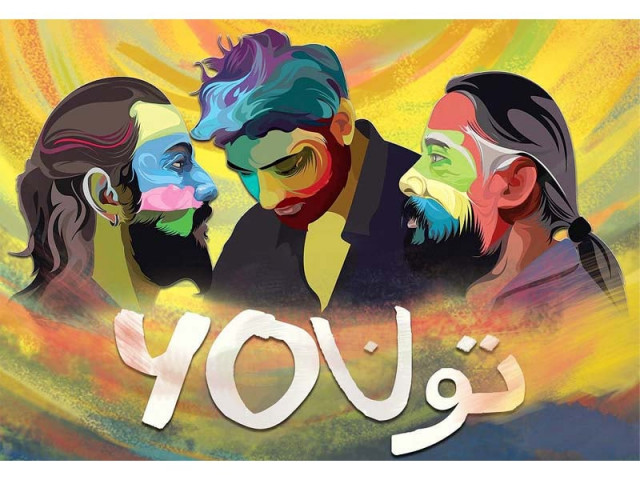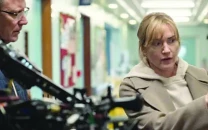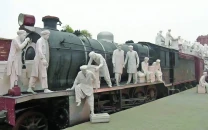The Sketches album ‘You’ is a worth-taking journey from Jamshoro to New Mexico
A product of six years of blood and sweat, You is a record fully drenched in tradition

A product of six years of blood and sweat, You is a record fully drenched in tradition. PHOTO: PUBLICITY
They say accuracy of language and connection with classics is an attitude. What cannot be said about a lot of our acts but can be said for The Sketches is that this band knows its lyrics and you have this straight the moment the first track on the newly-released album, You, starts to play. While arifana kalams are still a plaything for many, for these musicians this is serious business.
A product of six years of blood and sweat, You is a record fully drenched in tradition; a dialogue between the Bulleh Shahs and the Ghulam Farids, the Bhittais and the Sachals. This is not to say that antiquity is all that the album really offers. Pieced together simultaneously at Saif Samejo’s Lahooti Music Ashram and Jono Manson’s The Kitchen Sink, You is still very contemporary and fresh at its core. Its title takes root in the simple concept of surrendering oneself to the beloved who mirrors the highest reality.
Naseer and Shahab to release new single
Out of the 13 tracks on the album, there are 10 which feature artists other than the band’s regular lineup. If Mumtaz Sabzal’s banjo intro in Jogi does not send chills down your spine then Mark Clark’s percussions will surely get you. Ustad Sadiq’s tabla surfaces in Neend ki Naiya at just the right moment; Manson and Nomi Ali play a brilliant guitar riff on Ishq Da Jaam; Ishq Da Kalma has a ‘been’ (the instrument of snake charmers) solo by Jay Raam Jogi; who would have thought Karina Wilson’s violin could do justice to Hassan Dars’ Pakhi Pardes that alludes to the pain of not seeing the beloved?
It is not just the range of instruments that makes You a journey from “Jamshoro to New Mexico” worth taking. It is the resilience of the sarangi in the face of the drums, the marriage of the banjo and the harmonica and the shining of the changg and the borrindo that make the album stand out as a top-of-the-line production.
There is no arguing that Mann Kunto Maula is a monument in the canon of Hindustani classical music. Not one singing giant from our part of the world came and left without paying respects on the doorstep of Amir Khusrow. You’s rendition of the kalam is a bit stretched yet it does not snap throughout the runtime.
In a song that has Faraz Anwar playing both the acoustic and electric guitars (not to forget the two solos) and Gumby doing what he does best (apart from his candid commentary of affairs), what else really is missing? Nothing! (As Col Hans Landa would say, “That’s a bingo!”) You might have heard the inimitable Abida Parveen sing the kalam but this particular Main Sufi Hoon is one track that will continue to ring in your head long after you stop playing it.
Capturing spirituality and universal truth with Rumi
Mann Moriya can be called the album’s bonus track simply because it not only features Mai Dhai, but also lets her float like a butterfly, singing a Sardar Shah kalam that says, “Heart is a bird, it is a butterfly!”
The ending note of the record, Khahori, is an ode to Bhittai and the wandering ascetics of the land. Structured in a way similar to that of other ballads in the album, the English lines of this Pakistani production (no hard feelings to Waar) will warm your heart and make you hum to the chorus.
On Saif’s singing one must make a few observations. While his exceptional expressions leave you grinning, shake you up and even sweep you away in Jogi, Ek Insaan and Nind Nashay Vich, with ballads such as Neend ki Naiya, Meena and Sahib Mera, his voice turns rather nasal, toying with the spell these splendid compositions spin. Also, more than once in the album does the singer sound slightly off key. Nonetheless, with more hits than misses, Saif still drives the album home comfortably.
Fishing Rs1,000 from the pocket for someone who is so used to consuming free music might be a little difficult but, in Mekaal Hasan’s words, one hopes the world still comprises deluded individuals who believe in buying albums and helping musicians make a living out of their only trade.
Eliot says tradition is a matter of wider significance. It cannot be inherited and if you want it, you must obtain it with great labour. The seed of Dastkari has today sprouted into an epic journey.
Verdict: With You, The Sketches have arrived at the end of the rainbow!

Published in The Express Tribune, April 23rd, 2016.
Like Life & Style on Facebook, follow @ETLifeandStyle on Twitter for the latest in fashion, gossip and entertainment.



















COMMENTS
Comments are moderated and generally will be posted if they are on-topic and not abusive.
For more information, please see our Comments FAQ